从迷路上转回 Bring someone back from wandering
雅各书 James 5:19–20
Remember these points
I put these points at the top of my sermon-prep template to remind myself every week:
- Show that main point of passage relates to Jesus and his saving work
- (1 Cor 1:18) A truly gospel-centred message will not be acceptable in a synagogue or mosque
- Did I proclaim the gospel as the headline news of the sermon, rather than as a “by the way…”?
- Unbelievers are called to repent, believe, and be saved
- Believers are encouraged to abandon their old self, renew their minds, put on the new self in Christ
- Preach simple sermons, so that God’s people can see Christ more clearly and love him more dearly
News
Hook


Pick a sport you know well.
Is it important to know the rules of the game?
How do we determine if someone knows the rules?
Typically two ways:
- Ask them to recite the rules.
- See if they follow the rules when they play.
What happens when you play the sport but don’t know the rules?
What happens when you know the rules, but don’t follow them?
When you’re playing a game and see someone breaking a rule, what would you do?
Would you point it out to the player, your teammate nearby, the entire team, the ref…?
Would you just let it pass? Let someone else point it out?
Other possibilities…?
What we’ll learn today
- Just like knowing the rules of a game, knowing biblical doctrine is important.
- Just like following the rules when you play a game,
it’s even more important to follow biblical doctrine in our everyday lives. - Just like on a team, we (the church) have a responsibility to watch out for sin.
Passage

雅各书 James 5:19–20
我的弟兄们,你们中间
若有失迷真道的,有人
使他回转,这人该知道:
叫一个罪人从迷路上转
回便是救一个灵魂不死
,并且遮盖许多的罪.
Section 1 我的弟兄们 My Brothers
Passage
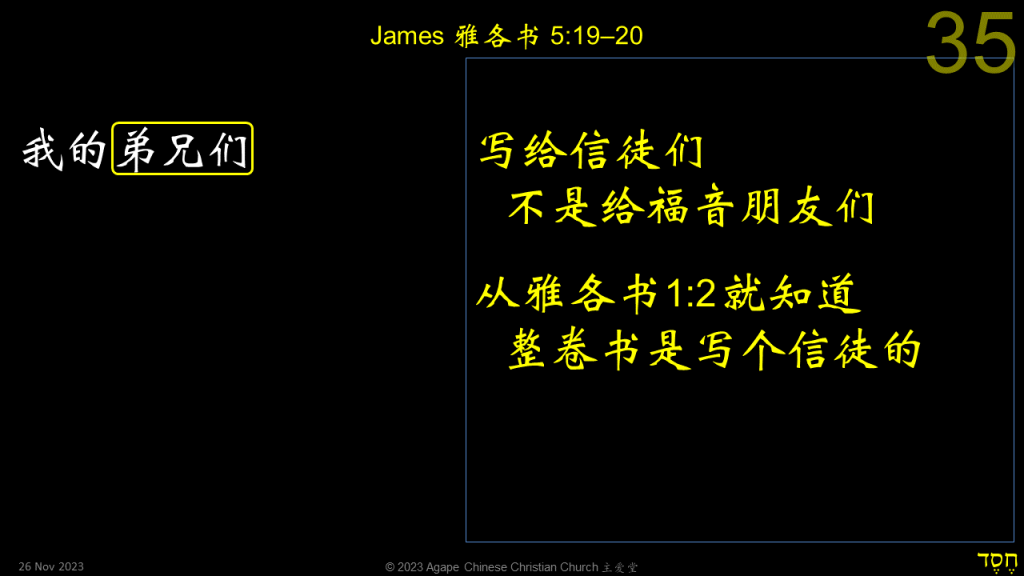
James said “my brothers,” which means he’s writing to brothers (and sisters) in Christ. I.e., he’s writing to Christians, not to unbelievers.
In fact, the entire book of James is aimed at Christians (we can see from James 1:2 “我的弟兄们…”).
This also means whatever we see in today’s passage (as well as in the the whole book) is directed to Christians.
Section 2 失迷真道 Wanders from Truth
Passage

In order to wander from the truth, you have to be in the truth first.
What is this truth?
This is the truth as we read in the Bible, including these things (a quick summary):
- God is the creator, not evolution.
- Humans disobeyed God, and will be forever be apart from God.
- God started the plan of salvation, to bring us back to him, so that we can be together again.
- God chose a people, Israel, to show the world how he wants us to live, and to show how none of us is able to live up to God’s standards.
- God sent his son Jesus to die for us, so that we don’t have to die.
- Jesus will return one day as our Lord and King, and we will be with God forever in his kingdom.
This is the gospel message given to us (in both the OT and NT).
How does one wander from the truth?
The verb here is “wandered,” a passive form. The emphasis is not on something or someone external to the person, but it’s the person himself/herself who wilfully chose to depart from the truth.
It is also not a question of ignorance, something like “I didn’t know that was wrong.” The one who wandered did so knowing full well that it’s wrong.
So we shouldn’t put the entire blame on someone or something else, the one who wandered wilfully did so, knowing full well that he or she is departing from the truth.
But not only that. Truth isn’t just knowing the Bible and what it says, but practicing what the Bible says. Look at some example passages:
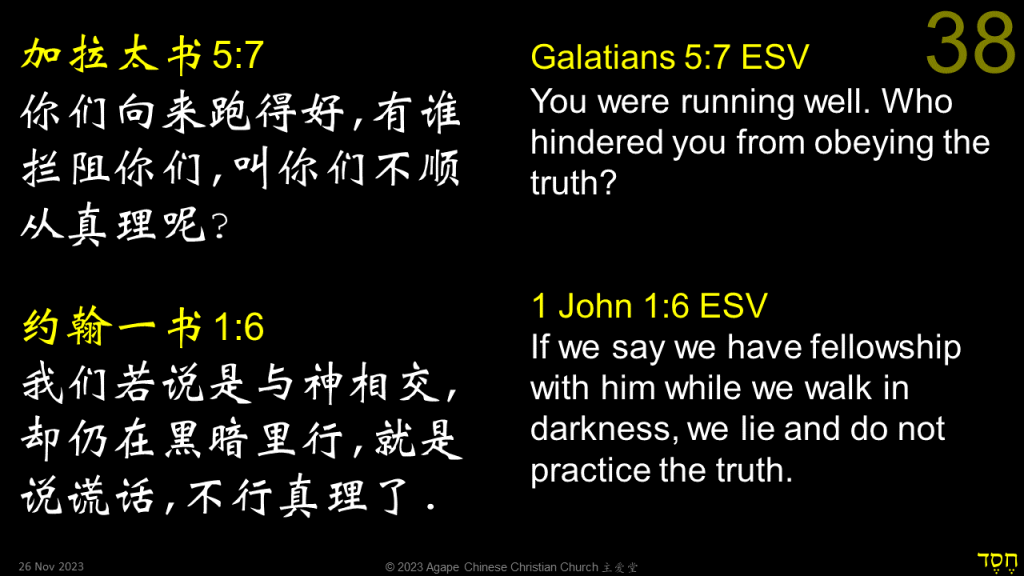
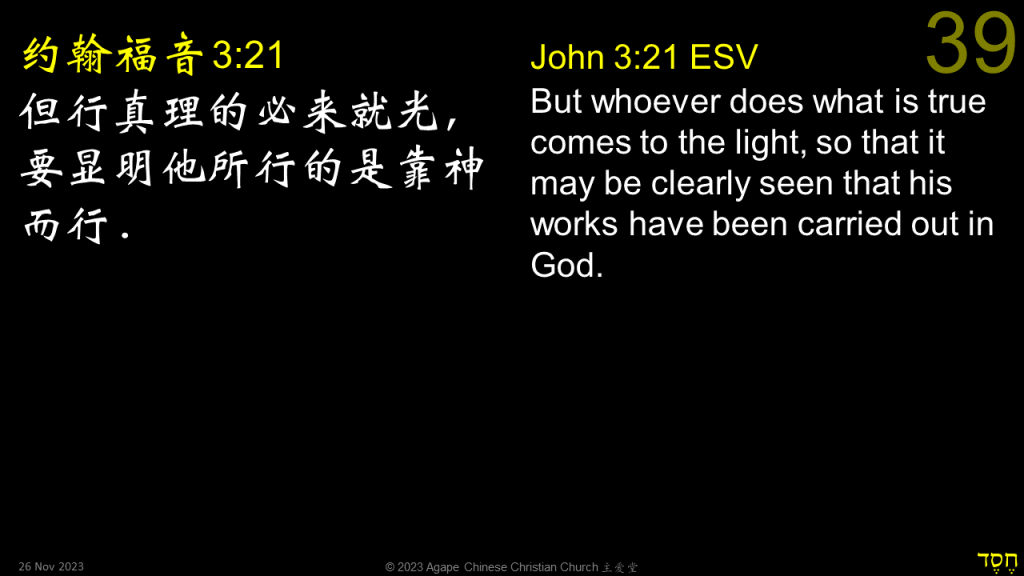
Lessons

- “The truth” is what God revealed to us, the contents of the Bible.
- “Someone wanders from the truth,” (we’re talking about a Christian): it’s not out of ignorance.
- Truth is not just head knowledge, but also practice.
If we’re not living it out, it’s useless (just remember the Pharisees).
Section 3 使他回转 Brings Him Back
Passage

Bring the person back to the truth, back to the Bible.
Whose responsibility is it to bring this person back?
- Elder, pastor?
- Deacons, other church leaders?
- The congregation?
We (whether leaders of the church or not) all have responsibility to bring this person back.
In Paul’s letters, the functions of mediating between God and human beings are shared by the entire Christian community; “He never says that these responsibilities belong to any one person or group.” [1]NIVAC, quoting from Robert Banks, Paul’s Idea of Community, 139–41.
As individual Christians, we have to watch out for sin, both in ourselves and in other Christians (but NOT in a judgemental way; we can’t go around every Sunday pointing out all the things that we see other people doing wrong!)
As a congregation (a church), we have the same responsibility. This is what Jesus taught in Matt 18:15–17 (especially Matt 18:17).
Lessons
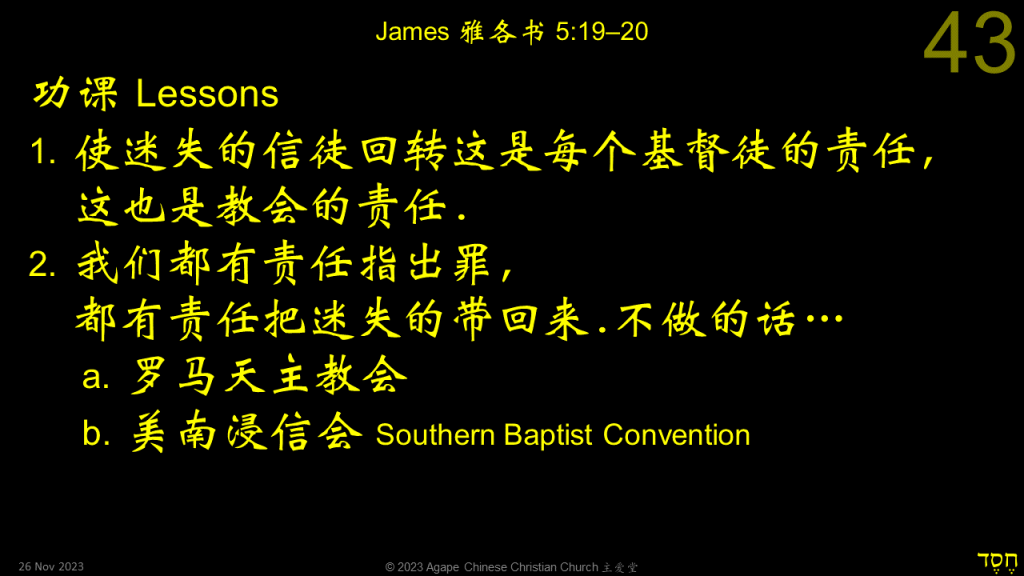
- Bringing a fellow Christian back from “wandering” is every Christian’s responsibility,
it’s also the responsibility of the Church. - We all have the responsibility to recognise sin,
and the responsibility to bring back the wanderer. Some well known examples of hiding sin:- Roman Catholic Church: For centuries, even now, they refused to officially admit wrongdoing
- Southern Baptist Convention (Wikipedia article here) [Newspaper articles in 2019 revealed >700 victims of sexual abuse by almost 400 SBC leaders, pastors and volunteers, over a period of 20 years. There’s currently accusations flying back and forth that they’re using the controversy of installing women pastors as a way to move attention from the sexual abuse accusations.]
Section 4 救灵魂不死 Save Soul from Death
Passage

Jas 5:20 “Let him know”: The “him” is the person who brought the sinner back to the truth.
“Sinner”: The sinner is the person who wandered from the truth.
Note that this sinner is among us, he or she is one of us. We’re not talking about unbelievers or people who has never heard the gospel. We’re talking about people in the church, who professed believe in Jesus, and who has now wandered from the truth.
Some people say “save his soul from death” (Jas 5:20) is talking about physical death. So the sinner dies, but his or her soul still goes to heaven. But that’s not what James is talking about; he’s talking about eternal death. This death has eternal consequences. It means NOT going to heaven, eternally separated from God (no second chance).
Lessons
Section 5 遮盖罪 To Cover Sin
Passage

“A multitude of sins” is straight-forward. What does “cover” mean?
Look at 2 passages:
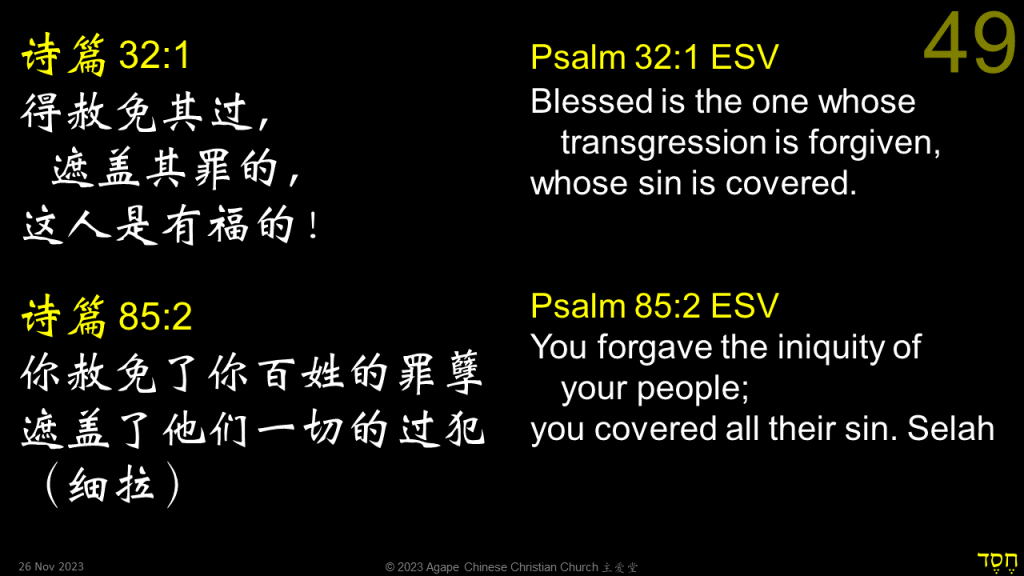
So what do you think “to cover sin” means?
How do you understand covering for sin?
To cover sin doesn’t mean to sweep it under the carpet!
In the OT, the Hebrew verb כפר (kpr) was used in Gen 6:14, when God told Noah to cover (kpr) the ark inside and out with pitch. This word appeared 102 times in the OT, and 97 out of 102 times it means to atone for sin. When they offer an animal for sacrifice, the blood of that animal atones for the people’s sins. The animal died, but the people had their sins forgiven. Just like in the first Passover in Exodus, the Passover lamb’s blood on the door allowed the firstborn inside to live.
Today, we have God’s Passover lamb, Jesus Christ, whose blood covered our sins. This is what covering means. Atonement!
Who can forgive sin?
Only God can forgive sins!
But if only God can forgive sins, why is James telling us about atonement (covering for sin)? Because we are to watch out for sin showing up in our own behaviour and also be sensitive to sin in our brothers and sisters.
We have the responsibility, as Christians, and as a church, to notice if someone has wandered off into sin, and to try and bring that person back. This isn’t just the responsibility of the elder or pastor, but of every person in the congregation.
Lessons
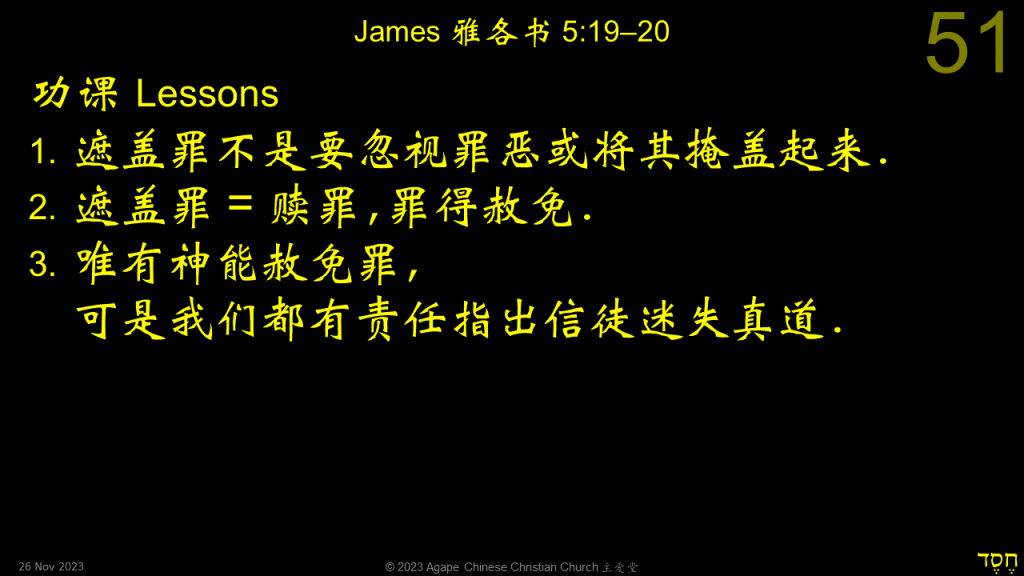
- To cover sin doesn’t mean to ignore it or to sweep it under the rug.
- To cover sin = atonement, the forgiveness of sins.
- Only God can forgive sins,
but we all have the responsibility to point it out when a believer wanders from the truth.
So What?


- Never just be content with the right doctrine. We need “right practice” to go with “right belief.”
- Sin is a problem both personal and corporate.
Each of us can sin, and the church as a whole (usually by ignoring sinful behaviour) can also sin. - When we see denial of biblical truth in society, we might not know what to do, or might entirely helpless. But within the church (an embassy of God’s Kingdom on earth), it’s not negotiable. Our job is to care and to rescue (bring back from wandering).
- Covering for sin isn’t just ignoring it or sweeping it under the rug.
It means atonement.
Jesus already paid the price for sin. We are thankful that through faith in Jesus, we can be right with God again.
Notes
| ↑1 | NIVAC, quoting from Robert Banks, Paul’s Idea of Community, 139–41. |
|---|

